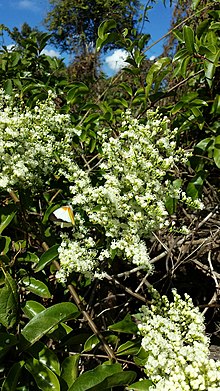
Vigna is a genus of flowering plants in the legume family, Fabaceae, with a pantropical distribution. It includes some well-known cultivated species, including many types of beans. Some are former members of the genus Phaseolus. According to Hortus Third, Vigna differs from Phaseolus in biochemistry and pollen structure, and in details of the style and stipules.
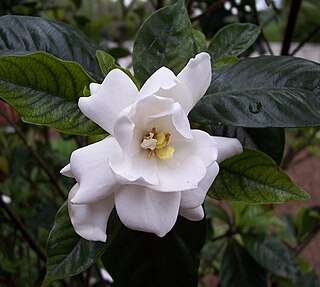
Gardenia is a genus of flowering plants in the coffee family, Rubiaceae, native to the tropical and subtropical regions of Africa, Asia, Madagascar and Pacific Islands, and Australia.

Pontederia is a genus of tristylous aquatic plants, members of which are commonly known as pickerel weeds. Pontederia is endemic to the Americas, distributed from Canada to Argentina, where it is found in shallow water or on mud. The genus was named by Linnaeus in honour of the Italian botanist Giulio Pontedera.

Cynoglossum is a genus of small-flowered plants in the family Boraginaceae.

Bonamia is a genus of the flowering plant family Convolvulaceae, commonly known as the bindweed family and named after the French physician and botanist François Bonamy (1710-1786). Members of the genus are commonly known as the lady's nightcap.

Polysphaeria is a genus of plant in the family Rubiaceae, and its native range is Madagascar and Tropical Africa. It contains the following 22 species according to Plants of the World Online:

Seddera is a genus of plants in the bindweed family Convolvulaceae. There are currently 20 known species of the plant. Although it is mainly African, the plant extends to Arabia and India.
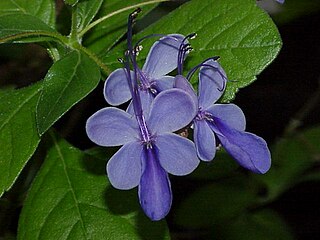
Rotheca is a genus of flowering plants in the family Lamiaceae. Estimates of the number of species in the genus vary from about 35 to as many as 60. Three of the species are native to tropical Asia, with the rest occurring in Sub-Saharan Africa. The type species for the genus is Rotheca serrata. It had originally been named Rotheca ternifolia, but this name is now considered illegitimate.

Ehretia is a genus of flowering plants in the borage family, Boraginaceae. It contains about 50 species. The generic name honors German botanical illustrator Georg Dionysius Ehret (1708–1770).
Adenodolichos is a genus of shrubs in the legume family Fabaceae, native to tropical Africa.
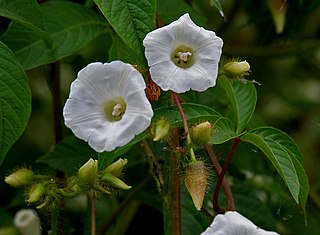
Merremia is a genus of flowering plants in the morning glory family, Convolvulaceae. Members of the genus are commonly known as woodroses.
Knoxieae is a tribe of flowering plants in the family Rubiaceae and contains about 131 species in 16 genera. Its representatives are found in Tropical and Southern Africa, the islands in the Western Indian Ocean, the Arabian Peninsula, Tropical and Subtropical Asia, and Northern Australia.
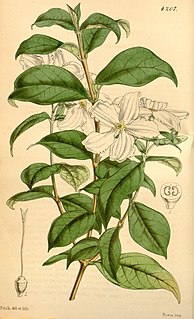
Heinsia is a small genus of flowering shrubs or small trees in the family Rubiaceae. They are native to tropical Africa. The genus was first formally named in 1830 by Augustin Pyramus de Candolle.
Astripomoea is a genus of flowering plants belonging to the family Convolvulaceae.
Distimake is a genus of flowering plants belonging to the family Convolvulaceae.
